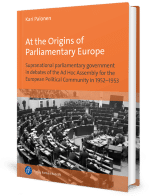We conducted an interview with Kari Palonen, author of the book “At the Origins of Parliamentary Europe. Supranational parliamentary government in debates of the Ad Hoc Assembly for the European Political Community in 1952–1953”. In this interview, we are asking about the background of the book, how the idea came about and what we can learn from the findings for today.
Interview on “At the Origins of Parliamentary Europe. Supranational parliamentary government in debates of the Ad Hoc Assembly for the European Political Community in 1952–1953”
Dear Kari Palonen, what questions are you addressing in your publication At the Origins of Parliamentary Europe?
The idea is to show how the members of the Ad Hoc Assembly, after in-depth debates, proposed a first detailed vision of a supranational parliamentary government for the European Political Community and outlined its institutional and procedural forms. Interestingly, the proposal remains much more consistent today than later attempts to parliamentarise the EU.
Since the late 1950s, the language of European integration has tried to hide its thoroughly political character, although the European level of politics has marked new dimensions of contingency and therefore required new forms of political action. The Ad Hoc Assembly’s proposal for supranationalism and parliamentary governance, contrary to the depoliticised narrative, represents an open politicisation of European integration. And this in two respects, namely identifying, accepting and institutionalising the new contingency involved in each of them.
It this sense, it is important not to rewrite a history of the winners, but to focus on the alternative ‘objective possibilities’ in history in the sense of Max Weber. The members of the Ad Hoc Assembly decided to consider parliamentary government as a realistic alternative to transcend both the quasi-natural orders of nation states and the purely intergovernmental forms of European integration.
In your publication, you rediscover a previously neglected origin of parliamentary Europe. How did the idea for this publication come about?
I wanted to contradict the conventional narrative of the European Parliament’s history, which sees a continuous progression of its powers. My approach is to discuss instead the ‘objective possibilities’ of alternative ways of doing things in the past. I wrote an article about the missed opportunity to parliamentarise the membership of the European Commission in 1960 (see History of Political Thought 2022). When I found the Ad Hoc Assembly and its debates online on the EUI website, I detected that it had argued for a full supranational parliamentary government for the European Political Community. Yet, curiously, the work of the Ad Hoc Assembly was hardly discussed by EU or parliamentary scholars.
What insights do the conceptual history and the early processes of parliamentarisation provide for parliamentary Europe today?
The Ad Hoc Assembly’s proposal illustrates how Western European integration could have proceeded towards a fully-fledged parliamentary government, which has never been considered since. Although the proposals of the Ad Hoc Assembly cannot be directly applied to today’s situation, they offer interesting perspectives for reopening the debates on the parliamentarisation of the EU.
In a way, I consider my study as a parallel approach to what Quentin Skinner did in Liberty before Liberalism (1998) to rediscover the neo-Roman concept of liberty that played an important role in early modern debates.
Was there anything that surprised you the most during your research?
It has further increased my respect for European parliamentarians, their conceptual innovations and their willingness to debate pro et contra and to change their views based on arguments in the debate. It cannot be emphasised enough that the members of the Ad Hoc Assembly were confronted with the construction of supranational parliamentary institutions and procedures for which there were no ready-made models or precedents. In the debates, I also found ideas such as cross-border constituencies for the European Parliament, which have still not been realised in the EU.
Who would you recommend this publication to?
Scholars of parliamentarism, Scholars of European studies as well as political, conceptual and intellectual history. Parliamentary and EU journalists, MEP interested in procedural and constitutional questions.
About Kari Palonen
 Kari Palonen (PhD, Political Science, University of Helsinki, 1975) is Professor of Political Science at the University of Jyväskylä, Finland, emeritus since 2015. He was Academy of Finland Professor for two 5-years periods, chair of the Academy of Finland Centre of Excellence ‘Political Thought and Conceptual Change’ (2006–2011). He was the founding editor of the journal Redescriptions, the co-founder of the History of Concepts Group and of the ECPR Standing Group Political Concepts. Since 2024 he is member of the Academia Europea. His recent monographs include: A Political Style of Thinking. Essays on Max Weber (ECPR Press 2017); Debates, Rhetoric and Political Action (with Claudia Wiesner and Taru Haapala) (Palgrave 2017); Parliamentary Thinking. Procedure, Rhetoric and Time (Palgrave 2018); Max Webers Begriffspolitik. Aufsätze aus zwei Jahrzehnten (Nomos, 2019); Politik als parlamentarischer Begriff. Perspektiven aus den Plenardebatten des Deutschen Bundestags (Barbara Budrich, 2021)
Kari Palonen (PhD, Political Science, University of Helsinki, 1975) is Professor of Political Science at the University of Jyväskylä, Finland, emeritus since 2015. He was Academy of Finland Professor for two 5-years periods, chair of the Academy of Finland Centre of Excellence ‘Political Thought and Conceptual Change’ (2006–2011). He was the founding editor of the journal Redescriptions, the co-founder of the History of Concepts Group and of the ECPR Standing Group Political Concepts. Since 2024 he is member of the Academia Europea. His recent monographs include: A Political Style of Thinking. Essays on Max Weber (ECPR Press 2017); Debates, Rhetoric and Political Action (with Claudia Wiesner and Taru Haapala) (Palgrave 2017); Parliamentary Thinking. Procedure, Rhetoric and Time (Palgrave 2018); Max Webers Begriffspolitik. Aufsätze aus zwei Jahrzehnten (Nomos, 2019); Politik als parlamentarischer Begriff. Perspektiven aus den Plenardebatten des Deutschen Bundestags (Barbara Budrich, 2021)
More interviews can be found on our blog.
Order “At the Origins of Parliamentary Europe” in our shop or download as e-book
At the Origins of Parliamentary Europe.
Supranational parliamentary government in debates of the Ad Hoc Assembly for the European Political Community in 1952–1953
by Kari Palonen


